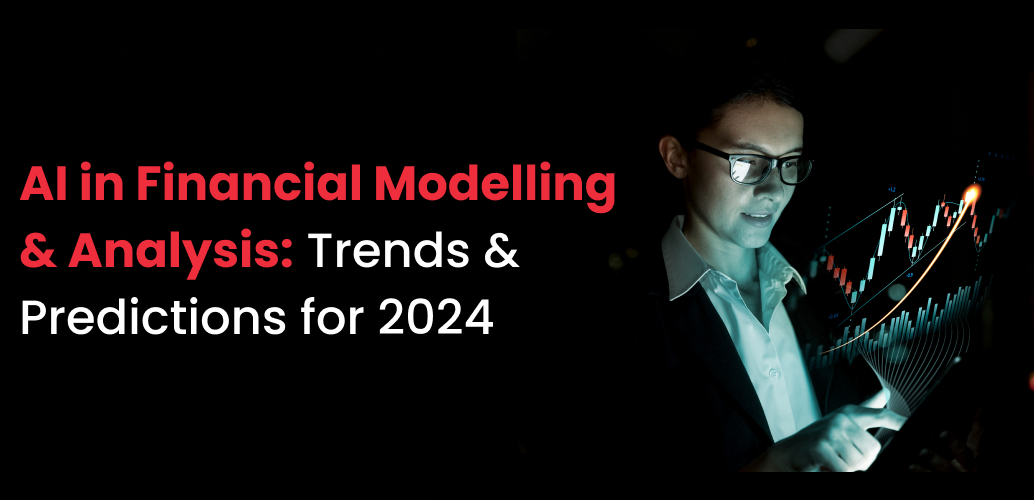Blog > AI in Financial Modelling and Analysis: Trends and Predictions for 2024
AI in Financial Modelling and Analysis: Trends and Predictions for 2024
January 29th, 2024

Key Trends and Predictions of AI in Financial Modelling and Analysis
- Better Forecasting Ability
- Detecting Security Breach
- Robots for Financial Guidance
- Personalised Financing
- Customer Support Chatbots
Preparing for the Breakthrough of AI in Financial Modelling and Analysis
- How can finance professionals prepare for integrating AI in financial Modelling and analysis in 2024?
- Can freshers benefit from AI-driven financial Modelling courses?
- Which Modelling tools and software should an aspiring financial analyst be proficient with?
- Are there any use-case examples of AI in the finance sector?
AI in financial Modelling and analysis is opening doors to accurate forecasting and improving the performance of models to help companies take advantage of data in decision-making.
To stay ahead of the curve, you cannot miss the recent trends and predictions set to transform the financial sector.
Key Trends and Predictions of AI in Financial Modelling and Analysis
According to Statista.com, the inclusion of AI in the finance sector will increase from 2022 to 2025. Nearly 50% of the surveyed executives expected their companies to adopt AI in the coming years.
This change in dynamics promises a secure career for those skilled in utilising AI in financial Modelling and analysis. Let’s look at some key trends and predictions that will turn the trajectories of traditional financial systems in 2024.
1. Better Forecasting Ability
AI tools ease the work of humans by skimming through large amounts of data at incredible speed. The finance sector will utilise the ability of AI to identify trends, patterns, and correlations in big data.
Doing so will help financial analysts produce forecasts that are more accurate. In return, the companies will be able to make better decisions.
2. Detecting Security Breach
The first thing that strikes our mind when it comes to our hard-earned money is its security. Be it an ordinary accident or a fraud, AI will assist in observing abnormal activities in real time across the systems.
Though AI can provide accurate risk analysis, taking care of the ethics and challenges is important. Many financial analyst courses train participants in ethical considerations and challenges in leveraging AI for financial Modelling and analysis.
3. Robots for Financial Guidance
Financial experts believe AI will play a big role in providing financial guidance. AI can assist customers with tasks like filing claims and applying for insurance.
AI models can use extreme weather predictions to recommend the best financial policies like ‘two-month flood insurance’ to customers residing in those areas. Such policy recommendations will support customers and service providers alike.
4. Personalised Financing
AI in financial Modelling and analysis will see the development of sophisticated tools to offer custom-tailored financial services. It will also help in analysing the large amount of data detailing the needs and specifications of customers.
AI will further help service providers to recommend personalised offers. The different services provided will further increase the size and complexity of the data collected. AI will again assist in compiling, managing, and navigating through it.
5. Customer Support Chatbots

AI has enabled customers to interact with service providers through visible engagement, like website chatbots. Similarly, many more wealth management and consumer banking sectors will seek to improve customer service.
The technologies of natural language processing will assist banks in solving the queries of their customers and save time to increase the organisation’s productivity.
Preparing for the Breakthrough of AI in Financial Modelling and Analysis
With every passing minute, AI in financial Modelling and analysis is shaping the finance industry's future. The key trends and predictions listed above point toward the need for both industry experts and aspiring financial analysts to prepare for this breakthrough of AI in their field.
upGrad Campus’s job-ready course fulfils this need to upskill its participants in leveraging AI to conduct financial Modelling and analysis efficiently.
Also read: Why Financial Modelling and Analysis Course Is Your Key Career Starter?
FAQs
1. How can finance professionals prepare for integrating AI in financial Modelling and analysis in 2024?
Finance professionals and aspiring financial analysts should stay updated with all the upcoming developments of AI in financial Modelling. They can also consider enrolling in a good financial Modelling course that includes this segment in their curriculum
2. Can freshers benefit from AI-driven financial Modelling courses?
You don't need any prior working experience to take AI-driven financial Modelling courses. Many online courses offer beginner-friendly courses that start by introducing generative AI in financial Modelling and analysis.
3. Which Modelling tools and software should an aspiring financial analyst be proficient with?
Proficiency in certain tools can significantly benefit financial analysts. Though a large variety of tools are widely used in the industry, there are some tools you cannot afford to miss. To excel in the industry, it is essential to be proficient with PowerBI, VBA, and Tableau.
4. Are there any use-case examples of AI in the finance sector?
A New York-based startup, Kasisto’s chatbot KAI enhanced customer experience and lowered the traffic in customer support centers. The AI-powered chatbot helped customers with financial decisions. Vodafone also adopted AI in its financial department to reduce risks, prevent data breaches, and create a faster innovation pipeline.
Also Watch:






Add a Comment